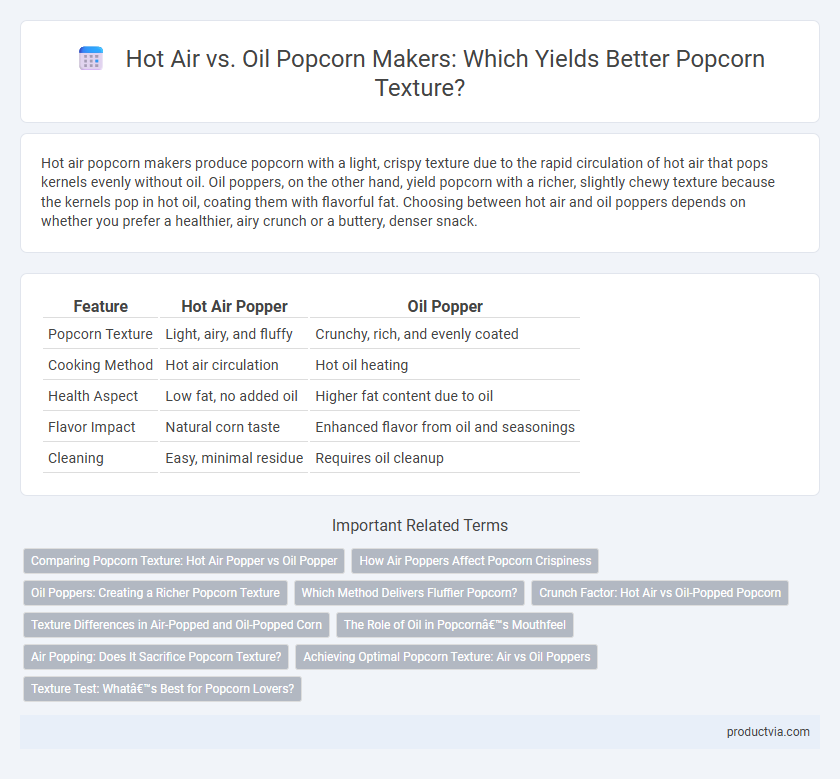Hot air popcorn makers produce popcorn with a light, crispy texture due to the rapid circulation of hot air that pops kernels evenly without oil. Oil poppers, on the other hand, yield popcorn with a richer, slightly chewy texture because the kernels pop in hot oil, coating them with flavorful fat. Choosing between hot air and oil poppers depends on whether you prefer a healthier, airy crunch or a buttery, denser snack.
Table of Comparison
| Feature | Hot Air Popper | Oil Popper |
|---|---|---|
| Popcorn Texture | Light, airy, and fluffy | Crunchy, rich, and evenly coated |
| Cooking Method | Hot air circulation | Hot oil heating |
| Health Aspect | Low fat, no added oil | Higher fat content due to oil |
| Flavor Impact | Natural corn taste | Enhanced flavor from oil and seasonings |
| Cleaning | Easy, minimal residue | Requires oil cleanup |
Comparing Popcorn Texture: Hot Air Popper vs Oil Popper
Hot air poppers produce popcorn with a lighter, drier texture as they use circulating hot air to pop kernels without added fat. Oil poppers yield a richer, crispier texture due to the oil coating each kernel, enhancing flavor and mouthfeel. The choice depends on whether you prefer a healthier, airy snack or a buttery, crunchier popcorn experience.
How Air Poppers Affect Popcorn Crispiness
Hot air poppers use rapidly circulating hot air to pop kernels, creating popcorn with a light and airy texture that is crispy without added oils. The absence of oil in air-popped popcorn results in a drier surface, which maintains crispiness longer compared to oil-popped varieties that can become soggy due to residual grease. This method produces healthier popcorn with a clean crunch that enhances seasoning adherence and overall mouthfeel.
Oil Poppers: Creating a Richer Popcorn Texture
Oil poppers coat popcorn kernels in heated oil, resulting in a richer, crunchier texture compared to hot air poppers. The oil helps distribute heat evenly, enhancing flavor absorption and creating a buttery, golden finish. This method produces popcorn with a more satisfying mouthfeel and deeper taste profile favored by many popcorn enthusiasts.
Which Method Delivers Fluffier Popcorn?
Hot air popcorn makers produce fluffier popcorn by circulating hot air that evenly heats kernels without adding grease, resulting in a lighter, crispier texture. Oil poppers coat kernels in hot oil, which creates a denser, slightly chewier texture due to the added fat and moisture retention. For maximized fluffiness and a low-calorie snack, hot air poppers outperform oil poppers in texture quality.
Crunch Factor: Hot Air vs Oil-Popped Popcorn
Hot air popcorn makers produce a lightweight, crisp texture by circulating heated air, resulting in a crunchier, less greasy popcorn ideal for those seeking a clean, pure flavor. Oil poppers coat kernels in hot oil, yielding a richer, denser crunch with a slightly chewy texture due to the oil's moisture retention and enhanced heat distribution. Choosing between hot air and oil-popped popcorn hinges on desired crunch factor, with hot air offering a lighter crispness and oil popping delivering a more robust, flavorful bite.
Texture Differences in Air-Popped and Oil-Popped Corn
Hot air popcorn makers produce a light, airy texture by circulating hot air that evenly heats kernels, resulting in crisp and less greasy popcorn. In contrast, oil poppers coat kernels in oil, delivering a richer, crunchier texture with a buttery mouthfeel and enhanced flavor absorption. The choice between air-popped and oil-popped popcorn significantly influences texture, with air poppers favoring a dry, fluffy outcome and oil poppers creating a denser, more indulgent snack experience.
The Role of Oil in Popcorn’s Mouthfeel
Oil in popcorn makers enhances the texture by coating each kernel, resulting in a richer, crispier mouthfeel compared to hot air poppers. The fat in oil helps to evenly distribute heat, producing popcorn with a tender interior and satisfying crunch. Hot air poppers yield lighter, drier popcorn but lack the buttery smoothness that oil imparts.
Air Popping: Does It Sacrifice Popcorn Texture?
Air popping with a hot air popcorn maker produces a lighter, crispier texture compared to oil poppers, which yield a richer, slightly denser popcorn due to the oil coating. The absence of oil in air-popped popcorn results in a drier, more natural flavor but may sacrifice the buttery mouthfeel and some chewiness that oil poppers provide. For those prioritizing healthier, low-calorie snacks, air poppers deliver a satisfying crunch without sacrificing the essential popcorn texture.
Achieving Optimal Popcorn Texture: Air vs Oil Poppers
Hot air poppers produce popcorn with a light, crispy texture by circulating hot air that evenly heats kernels without adding fat, yielding a healthier snack. Oil poppers coat kernels in hot oil, resulting in a richer, crunchier texture and enhanced flavor due to Maillard reactions during frying. Selecting between hot air and oil poppers depends on the desired popcorn mouthfeel--air poppers are ideal for dry, fluffy popcorn, while oil poppers excel at creating a crisp, buttery finish.
Texture Test: What’s Best for Popcorn Lovers?
Hot air popcorn poppers produce light, airy kernels with a crisp texture, ideal for those seeking a healthier, less oily snack. Oil poppers create popcorn with a richer, buttery finish and a slightly denser crunch due to the coating of hot oil during popping. Texture tests reveal that hot air poppers emphasize a dry, fluffy consistency while oil poppers deliver a moist, tender mouthfeel preferred by many popcorn enthusiasts.
Hot air vs oil popper for popcorn texture Infographic

 productvia.com
productvia.com